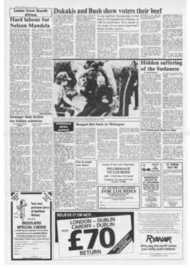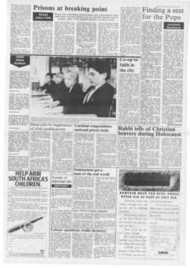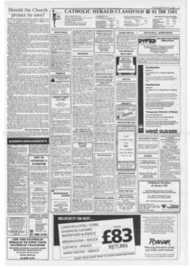Page 2, 22nd July 1988
Page 2

Report an error
Noticed an error on this page?If you've noticed an error in this article please click here to report it.
Tags
Share
Related articles
Sudan Floods' Response
Sudan's South Short Of Food
Sudan Relief Aid In Jeopardy
Church Calls For Sudan Support
Sudanese 'play Games' With Peace Proposals
Hidden suffering of the Sudanese
by Joanna Moorhead ORDINARY life has completely ceased to exist in Southern Sudan, according to one of the country's Catholic bishops who was in Britain this week.
"There is now no-one in the south who has not been affected in some way by the war there," said Bishop Vincent Mojwok of Malakal, who was in London to meet CAFOD staff and brief them on the situation in his country.
The guerrilla war being fought between government troops and the Sudanese People's Liberation Army (SPLA) is now in its fifth year, and millions have been forced to abandon their farms and smallholdings and seek shelter in the alreadyovercrowded towns.
Some have even fled to neighbouring Ethiopia, while others have boarded dangerously-overloaded trains to Khartoum in a desperate attempt to escape the gunfire and mines which have become commonplace in the south.
Even the most stalwart country dwellers were being forced off their land, said the bishop. "Soldiers on both sides of the conflict take away the animals for food for themselves. After the livestock have gone, life is virtually impossible for the villagers.
"In my diocese almost all the people have left the rural areas and fled to the towns — Malakal, which used to have a population of 50,000, has been swollen to 200,000 by the displaced. This means the land is not being cultivated and so we are having to rely more and mote on food provided by the agencies. We are dependent on food from overseas."
The Catholic agency Sudanaid, which is supported by CAFOD, was one of the few still managing to get help through to those worst affected by the crisis, said Bishop Mojwok. It provided food, medicine and shelter to those who found themselves destitute in the towns.
Bishop Mojwok said he was not bitter about the lack of reporting of the Sudanese situation in the west, but he wished the plight of his people was more widely known. "Part of the problem is that communications are very difficult in Sudan, so it is hard for journalists to visit and report back. Certainly, not enough is known about us."
blog comments powered by Disqus











